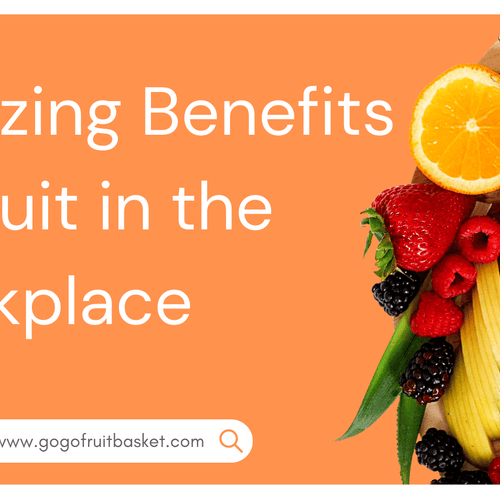We are now well into 2016, and now is usually the time of year when people will begin to take stock of
the New Year’s resolutions that they made at the beginning of the year. As is often the case,
some of perhaps all of these resolutions may have fallen by the wayside, due to
time commitments or possibly because of simple lack of willpower.
We are now well into 2016, and now is usually the time of year when people will begin to take stock of the New Year’s resolutions that they made at the beginning of the year. As is often the case, some of perhaps all of these resolutions may have fallen by the wayside, due to time commitments or possibly because of simple lack of willpower.
It probably goes without saying that, here at Gogo Fruit Baskets, we’ve got a vested interest in healthy eating and eating well. In the inevitable rush to detox after weeks of indulgence, many people will start the New Year with a vow to introduce a healthier diet into their lives.
But how long does it last? And how realistic are we being with ourselves when we make a personal vow to revolutionise our whole lifestyle? We reached out to some of the world’s most prolific fitness and healthy eating bloggers to get their opinion.
Their verdict was surprisingly unanimous…
Jenna Farmer
"I think people give up on New Year’s Resolutions because they’re based on unrealistic expectations. We never make resolutions to simply nourish our bodies by eating a few more portions of vegetables a week or find 10 minutes a day to meditate. Instead, our resolutions aim to change us completely: whether it’s losing 3 stone, becoming a stress-free yoga goddess or the perfect friend or partner! These are almost always doomed to fail since we can’t change who we are (nor should we want to!)"
http://www.abalancedbelly.co.uk/
Amy Morris
“Firstly, there is only one type of ‘diet’ I believe in and recommend to my clients, and that is one rich in nutrients and low in junk food (and junk ingredients).
I believe when each New Year comes around, too many people place too much pressure on themselves to achieve dramatic weight loss, which I believe can fail for two simple reasons and none of it has anything to do with will power!
The first being people do not really have a plan – so it is great in life to set yourself goals, but if you do not set out how you can achieve them (especially for things like weight loss which require forming new healthy habits), it is like a football team saying they want to win each match of the season, but then not having a strategy set out of how to do this before each game is played.
And secondly, I believe people set their first goal too big. Now what I mean is, the first goal should be achievable and within easy reach, so let’s say to lose 1lb in your first week. This is a safe amount of weight to lose, and realistic too if you make some small healthy changes to your diet and lifestyle. But will only be achievable if you have set out your plan first to help get you there.
So a plan aimed at losing weight could include things like;
- reducing sugary cakes and sweets,
- cutting out all soft drinks,
- or increasing vegetables in your diet.
I am a real fan of this last point as by doing so, you fill up quicker from all the fibre that vegetables contain, and so will reduce the need to get a fix for your sweet tooth.
Once you have achieved your first weight loss goal, you will then release feel good endorphin’s and get a natural high that will enable you to feel good about what you have just achieved, and will help you to keep going and will provide the motivation to start making more small healthy changes to your diet. By missing out on any sort of feel good emotion from achieving even one small weight loss goal, I believe this is the missing link for people who try sticking to even the healthiest and nutritious of diets but feel for some reason they can’t.
So, weight loss in my opinion, is not about will power at all – it is about training yourself to set achievable goals that make you a) feel good and want to repeat this action (as we do not want to repeat those instances we feel we have failed), and b) repeating this new healthy action that caused the weight loss over and over will in turn create a new habit, which takes between 30-60 days to really be ingrained and second nature).”
http://www.greathealthnaturally.co.uk/
Ellie Bradley
I think most people give up because they make too many changes at once, cut too many things out of their diet and don’t give themselves any wiggle room. So if they slip up once (which may be inevitable given that they have put such strict rules on themselves) they think they have failed and given up.
http://www.ellielivinghealthy.com
Petra Kravos
I believe many diets fail as people try to do too much at the same time too soon. They go on a restrictive diet and start a demanding exercise regime which is not easy to maintain. Changing your lifestyle overnight to lose weight will never work. It’s just too hard.
Better approach is to gradually introduce a healthier lifestyle which will last a lifetime. And this doesn’t mean you cannot have your cake. Yes, you can, just make sure you are active enough so you don’t gain weight!
http://www.behealthynow.co.uk/
Jo Hodson
I believe most people ‘give up’ on diets for two main reasons. Firstly, because they have created an environment based on a negative i.e removing something or not being allowed certain things. This could be so much more powerful if the mindset were to be one of ‘crowding out’ to focus on what is added by way of healthy foods, such that the less desirable foods are literally crowded out. Secondly, people make huge dietary shifts but then do not upgrade their wider environment to match, a new diet will never become a long term lifestyle change if the entire mind-body shift is not sought beys the goal itself.
Rachel O’Donnell
I think the main reason people give up on diets or New Year’s Resolutions is because they focus too much on restriction and deprivation. I don’t think “diets” are sustainable, we should be focusing more on including healthy whole foods and limiting unhealthy processed ones. We shouldn’t put so much pressure on ourselves to be perfect all of the time, everything in moderation!
Charlotte Moore
Diets don’t work which is why most of us spend most of our lives continually ‘failing’. They are usually a powerful short-term fix for holidays, Christmas and special occasions, but the results don’t last because the lifestyle is unsustainable. The long-term solution is to follow a healthy lifestyle that YOU can maintain. Add one small change at a time and challenge your taste buds to try something new at least once a week.
Try simple food swaps – white rice for brown, white potatoes for sweet potatoes, go decaff for your morning cuppa, white tea for green tea. Eat homemade desserts that are a healthier version of what you already love. Take it one day at a time and give yourself a lifetime of success.
Dannii Martin
The reason why so many people give up on diets and resolutions is because they set themselves unrealistic goals. They cut out whole food groups and quickly realise that they can’t do that and then they just give up. If they set themselves realistic goals, they would be much more likely to stick to it.
http://www.hungryhealthyhappy.com/
Charlotte Thomas
I think most diets are doomed to fail because they’re seen as short-term periods of deprivation. As soon as you ban things such as biscuits and chocolate they become all you can think about and you start to dread social occasions as it feels like you’re missing out when you can’t tuck into the canapes or have a drink. It’s much better to take a positive approach and choose to eat well to fuel your body rather than take a negative stance and say ‘I’m not allowed this, I’m not allowed that’. Think about all the benefits you get from eating well – more energy, better skin and hair – and it’s much easier to make healthier choices. When you’re eating well the majority of the time the odd packet of crisps or takeaway isn’t going to hurt. Think of it as a lifestyle choice not a diet.
Liz “The Green Spirit”
People give up on diets and diet-based January resolutions because of the misconception surrounding the term “diet”. Diet implies restriction, and sometimes people tend to go for a drastic diet after the Holidays. I believe in a step-by-step approach, by starting to change slowly your eating habits, for instance, cut off white bread, and once you’re used to it, carry on by avoiding sugary drinks and so on. That way it doesn’t feel like you’re doing such a big sacrifice and depriving yourself. It’s that feeling of deprivation that might lead people to give up on their resolutions, and feel discouraged.
http://www.smellslikeagreenspirit.com/
Monica Zolczer
I think the problem with New Year’s resolutions is that people are too ambitious to change their dietary or fitness lifestyle from the outset so that the challenge proves too difficult to accomplish. It would be much more sensible and achievable for people to set smaller, more realistic goals for each week or perhaps for each month so that they can gradually build up towards their ultimate goal.
https://mindfullymoni.wordpress.com/
Poppy Chiara
The entire concept of dieting is flawed, in my opinion. Nobody goes on a diet in January expecting it to be a permanent lifestyle change; instead it is just a temporary measure until you hit a target weight, or get bored of depriving yourself of certain foods.
It’s difficult to stay motivated when you’re surrounded by online and print media declaring how you can ‘instantly drop pounds with this one amazing trick’ – it isn’t realistic or healthy, and means that people expect weight loss to be easy.
Dieting is typical of our quick fix culture which thrives on instant gratification, and when a person doesn’t see any drastic weight loss effects in the first couple of months, the sacrifices don’t seem worth it and they give up. The key to sustainable weight loss is being patient and making healthier lifestyle choices, not following fad diets!
Natalie Tamara
“I think the reason that people give up on diets is that they’re focusing on a short-term solution to short-term goals. Most “diets” are reductive, honing in on specific ingredients or food groups as the enemy, so they do nothing to change our mindsets or habits in the long-term.
One way to stay on track with developing healthier habits is to be kind to yourself; going off-track once doesn’t mean it’s over! Try to understand what works for you and when you’re most likely to indulge. For me, I know I have to put in the prep time at home so I have healthy meals and snacks to see me through the working day.”
Sarah Kirby
From my own experience of New Year dieting I have found that it is unrealistic to sustain depriving myself of things for any longer than a few weeks. The New Year is a time when people are generally pretty motivated and feeling positive about being better than they were the year before. Therefore they may go into the New Year with high expectations and unrealistic goals which ultimately end up making them feel pretty unhappy. I try to live by the rule of a more balanced, healthy and realistic lifestyle. I know that if I deprive myself of the things that I enjoy to eat then I will end up feeling unhappy and more likely to binge eat and completely fall off the wagon. I personally find that the My Fitness Pal app works well for me because my calories are restricted to an amount to help me to lose weight, but I also have the freedom within that limit to eat what I please.






